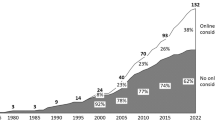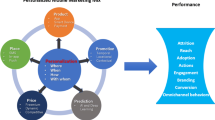Abstract
Travel booking behavior has changed substantially over the past two decades. The traditional approach of utilizing travel agents and booking ahead has evolved into a fast-paced, last-minute booking environment. This evolution has had substantial effects on revenue management (RM) in the areas of forecasting, pricing and online travel agency inventory allocations. These changes have made understanding the consumer booking process a necessary requirement for success. This article reviews the relevant literature on this historical shift and the effects it has had on RM.
Similar content being viewed by others
References
Asvanunt, A. and Kachani, S. (2006) Optimal Purchasing Policy for Strategic Customers under Different Dynamic Pricing Models. Proceedings of the Presentation at the 6th Annual INFORMS Revenue Management and Pricing Section Conference; New York. Columbia University.
Bangwayo-Skeete, P.F. and Skeete, R.W. (2015) Can Google data improve the forecasting performance of tourist arrivals? Mixed-data sampling approach. Tourism Management 46 (2015): 454–464.
Barthel, J. and Perret, S. (2015) OTAs – A Hotel’s Friend or Foe? How Reliant are Hotels on OTAs?, hospitality net, http://www.hospitalitynet.org/news/4070994.html, accessed 1 October 2015.
Carroll, B. and Siguaw, J. (2003) The evolution of electronic distribution: Effects on hotels and intermediaries. The Cornell Hotel and Restaurant Administration Quarterly 44 (4): 38–50.
Chen, C. and Schwartz, Z. (2008) Room rate patterns and customers’ propensity to book a hotel room. Journal of Hospitality & Tourism Research 32 (3): 287–306.
Chen, C.-C. and Schwartz, Z. (2013) On revenue management and last minute booking dynamics. International Journal of Contemporary Hospitality Management 25 (1): 7–22.
Chen, C.-C., Schwartz, Z. and Vargas, P. (2011) The search for the best deal: How hotel cancellation policies affect the search and booking decisions of deal-seeking customers. International Journal of Hospitality Management 30 (1): 129–135.
Choi, S. and Kimes, S.E. (2002) Electronic distribution channels’ effect on hotel revenue management. Cornell Hotel & Restaurant Administration Quarterly 43(3): 23.9.
Claveria, O., Monte, E. and Torra, S. (2015) A new forecasting approach for the hospitality industry. International Journal of Contemporary Hospitality Management 27 (7): 1520–1538.
Cross, R.G., Higbie, J.A. and Cross, D.Q.D. (2009) Revenue management’s renaissance a rebirth of the art and science of profitable revenue generation. Cornell Hospitality Quarterly 50 (1): 56–81.
Gasdia, M. (2015) Mobile travel shopping hits tipping point – But PC still dominates booking, http://www.phocuswright.com/Travel-Research/Research-Updates/2015/Mobile-Travel-Shopping-Hits-Tipping-Point-But-PC-Still-Dominates-Booking, accessed 1 October 2015.
Jerath, K., Netessine, S. and Veeraraghavan, S.K. (2010) Revenue management with strategic customers: Last-minute selling and opaque selling. Management Science 56 (3): 430–448.
Law, R. (1998) Room occupancy rate forecasting: A neural network approach. International Journal of Contemporary Hospitality Management 10 (6): 234–239.
Noone, B.M. and Mattila, A.S. (2009) Hotel revenue management and the Internet: The effect of price presentation strategies on customers’ willingness to book. International Journal of Hospitality Management 28 (2): 272–279.
O’Connor, P. and Frew, A.J. (2002) The future of hotel electronic distribution: Expert and industry perspectives. The Cornell Hotel and Restaurant Administration Quarterly 43 (3): 33–45.
Pan, B., Chenguang Wu, D. and Song, H. (2012) Forecasting hotel room demand using search engine data. Journal of Hospitality and Tourism Technology 3 (3): 196–210.
Schwartz, Z. (2006) Advanced booking and revenue management: Room rates and the consumers’ strategic zones. International Journal of Hospitality Management 25 (3): 447–462.
Schwartz, Z. (2008) Time, price, and advanced booking of hotel rooms. International Journal of Hospitality & Tourism Administration 9 (2): 128–146.
Schwartz, Z. and Chen, C.-C. (2012) Hedonic motivations and the effectiveness of risk perceptions – Oriented revenue management policies. Journal of Hospitality & Tourism Research 36 (2): 232–250.
Shen, Z.J.M. and Su, X. (2007) Customer behavior modeling in revenue management and auctions: A review and new research opportunities. Production and Operations Management 16 (6): 713–728.
Su, X. (2007) Intertemporal pricing with strategic customer behavior. Management Science 53 (5): 726–741.
TravelClick (2015) Hoteliers continue to see growth in bookings via online channels, http://www.travelclick.com/en/news-events/press-release/hoteliers-continue-see-growth-bookings-online-channels, accessed 1 October 2015.
Uysal, M. and El Roubi, M.S. (1999) Artificial neural networks versus multiple regression in tourism demand analysis. Journal of Travel Research 38 (2): 111–118.
Weatherford, L.R. and Kimes, S.E. (2003) A comparison of forecasting methods for hotel revenue management. International Journal of Forecasting 19 (3): 401–415.
Yang, X., Pan, B., Evans, J.A. and Lv, B. (2015) Forecasting Chinese tourist volume with search engine data. Tourism Management 46 (2015): 386–397.
Yang, Y., Pan, B. and Song, H. (2014) Predicting hotel demand using destination marketing organization’s web traffic data. Journal of Travel Research 53 (4): 433–447.
Zhou, Y.-P., Fan, M. and Cho, M. (2005) On the Threshold Purchasing Behavior of Customers Facing Dynamically Priced Perishable Products. Seattle, Washington DC: University of Washington.
Author information
Authors and Affiliations
Corresponding author
Rights and permissions
About this article
Cite this article
Webb, T. From travel agents to OTAs: How the evolution of consumer booking behavior has affected revenue management. J Revenue Pricing Manag 15, 276–282 (2016). https://doi.org/10.1057/rpm.2016.16
Received:
Revised:
Published:
Issue Date:
DOI: https://doi.org/10.1057/rpm.2016.16




